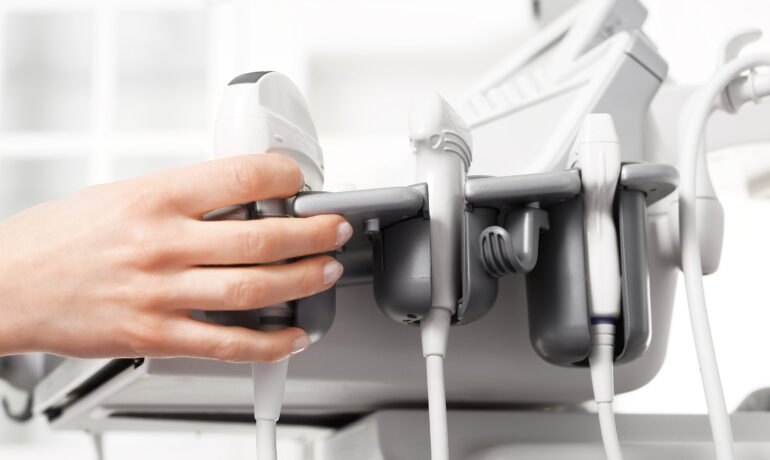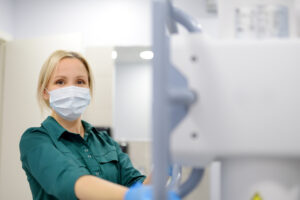In the dynamic world of modern healthcare, the role of General Practitioners (GPs) is evolving rapidly. No longer limited to routine check-ups and basic examinations, GPs are increasingly becoming essential diagnosticians who play a pivotal role in early disease detection and patient management. One of the significant advancements empowering GPs in this transformation is the integration of Point-of-Care Ultrasound (POCUS) into their daily practice.
This article explores the transformative power of POCUS in GP practices and how the utilisation of this technology can not only enhance patient care but also claim Medicare benefits through the acquisition of a Location Specific Practice Number (LSPN) and participation in the Diagnostic Accreditation Scheme (DIAS).
The rise of Point-of-Care Ultrasound in General Practice
- Enhanced diagnostic accuracy: POCUS provides GPs with real-time imaging capabilities, enabling them to visualise internal structures quickly. This assists in the immediate evaluation of various conditions, from detecting abdominal abnormalities to assessing musculoskeletal injuries.
- Efficient patient management: POCUS expedites the diagnostic process, allowing GPs to make faster, more informed decisions. This leads to quicker initiation of treatments or referrals, ultimately improving patient outcomes.
- Reduced patient anxiety: Patients often face anxiety or frustration when referred to external imaging centres for tests. With in-house POCUS, GPs can alleviate this anxiety by providing immediate answers, discussing results, and offering reassurance.
- Cost savings: For patients, in-house POCUS can translate into cost savings compared to external imaging facilities. It minimises travel and consultation expenses associated with specialist appointments.
Clinical applications of POCUS
POCUS is a versatile tool that can be applied across various medical specialties within general practice:
- Cardiology: GPs can use POCUS to assess cardiac function, detect structural abnormalities, and evaluate for conditions like pericardial effusion and heart failure.
- Abdominal medicine: POCUS aids in the evaluation of abdominal pain, detecting gallstones, assessing liver and kidney function, and diagnosing conditions such as appendicitis.
- Musculoskeletal examination: GPs can use POCUS to examine joints, tendons, and muscles, making it valuable for diagnosing injuries and guiding injections.
- Obstetrics and gynaecology: In-house POCUS can be used for early pregnancy confirmation, foetal heartbeat detection, and monitoring foetal growth.
- Lung and thoracic examination: POCUS assists in assessing lung function, identifying pleural effusions, and guiding thoracentesis procedures.
- Vascular examination: GPs can use POCUS to evaluate blood flow in arteries and veins, aiding in the diagnosis of deep vein thrombosis (DVT) and arterial occlusions.
Accessing Medicare benefits
In Australia, Medicare provides essential healthcare support to citizens. General Practices can participate in Medicare to claim benefits for eligible services. To introduce POCUS into their practice and claim Medicare benefits, GPs should follow these key steps:
- Acquire a Location Specific Practice Number (LSPN): An LSPN is a unique identifier for a specific practice location. GPs can apply for an LSPN through Medicare. This number allows the practice to participate in Medicare and claim benefits for eligible services.
- Access accredited POCUS training: Proper training is essential to ensure the safe and effective use of POCUS in GP practices. GPs and practice staff should undergo accredited POCUS training programs to gain the necessary skills and knowledge.
- Integration of POCUS into practice: After training, practices can integrate POCUS into their daily operations, making it a routine part of patient care. This includes selecting appropriate POCUS equipment and ensuring it meets safety and quality standards.
- Billing and claiming GPs can claim Medicare benefits for POCUS examinations performed in their practices. It’s crucial to accurately document and code POCUS procedures for billing purposes.
The Diagnostic Accreditation Scheme (DIAS)
To further enhance the credibility and quality of POCUS services in general practice as well as accessing Medicare benefits, GPs need to participate in the Diagnostic Accreditation Scheme (DIAS). DIAS is a national program that assesses and accredits diagnostic imaging services, including POCUS, against rigorous quality and safety standards.
To get DIAS accreditation, practices must complete a comprehensive evaluation of the POCUS services. Accreditation is complex and ongoing to ensure that the practice adheres to strict standards, including staff qualifications, equipment maintenance, and image quality.
Benefits of DIAS accreditation
- Enhanced patient confidence: Accreditation reassures patients that the practice adheres to high-quality standards, contributing to their confidence in the diagnostic services offered.
- Streamlined Medicare claims: DIAS accreditation simplifies the Medicare claiming process for POCUS services, reducing administrative burden.
- Professional development: Accreditation encourages ongoing professional development among practice staff, ensuring that they stay current with best practices and technological advancements.
- High standards of care: DIAS fosters a culture of continuous improvement, driving practices to maintain and enhance their standards.
The integration of Point-of-Care Ultrasound (POCUS) into General Practice indicates a new era of healthcare delivery in Australia. GPs armed with POCUS capabilities can deliver more efficient, accurate, and patient-centric care. Moreover, with the ability to claim Medicare benefits through the acquisition of an LSPN and participation in the Diagnostic Accreditation Scheme (DIAS), POCUS becomes a sustainable and financially viable addition to general practice. As technology continues to advance, POCUS is set to play an even more significant role in empowering GPs to diagnose and manage a wide range of medical conditions, ultimately enhancing the health and well-being of their patients.
Speak tour DIAS consultants
At Excelsior Accreditation, our dedicated consultants specialise in assisting practices to not only attain but also sustain their Diagnostic Accreditation Scheme (DIAS) accreditation. With our expertise, practices can fast-track the complex, rigorous accreditation process, ensuring adherence to stringent quality and safety standards without the additional time-consuming administrative process.
We are committed to empowering healthcare providers to offer top-tier diagnostic services, fostering patient trust, and facilitating seamless Medicare claims, ultimately helping you provide an exceptional standard of care in general practice.






